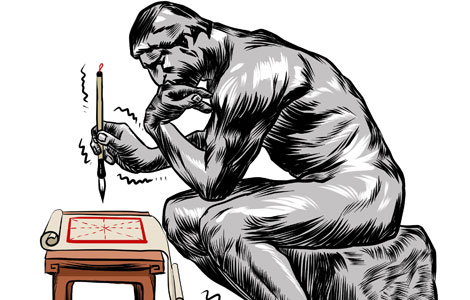Officials: A matter of faith
Updated: 2013-10-09 09:51
By Ji Zhebu (China Daily)
|
|||||||||||
Restoring the balance
In his survey, Xiao also asked, "Do you believe Communism will be fully implemented eventually?" Almost 43 percent of respondents chose "Definitely", while 24 percent opted for "Possibly". More than 24 percent selected "Hard to tell" and 3.2 percent chose "It is impossible". The rest opted for "I don't know".
"The answers actually shocked me a little at the time because they revealed that some Party members have a vague understanding of, and faith in, Communism. We have to admit that Buddhists and Christians have formed specific images and people can see what they are praying and talking to. But Communism is an ideology that is hard to touch and see," said Xiao.
Xiao called for specific goals to be established as a means of detailing and universalizing communist ideology in both the material and democratic aspects, which would help Party members to clarify their roles, he said.
He said China has made slow progress in recent decades in researching the political faith of officials through the evaluation of their attitudes to politics, morality and values.
"Insufficient evaluation of these topics has directly contributed to the failure of our anti-corruption and corruption-prevention mechanisms," he said.
In addition, he called for the strict management and supervision of officials, especially those in high-level positions that wield great power. He urged greater public transparency regarding the private assets held by officials and said public and media scrutiny should be encouraged.
"Religious doctrines tell believers to perform good acts, to forgive and offer assistance to other people, things that are not irreconcilable with Communism," said Wei.
However, he stressed that doesn't mean that Party members' belief in Communism should change. On the contrary, that belief should be maintained in the light of the limitations and negative aspects of religion. Decision makers responsible for promoting the best interests of the public should not make decisions based on God, Buddha or superstition, but should use scientific methods to actively seek solutions when faced with tough problems.
Today's Top News
CNOOC offering 25 blocks for cooperation
Li plans to seek deeper trust with neighbors
Obama to name Yellen as next Fed chair
Obama says he'll negotiate once 'threats' end
Xi calls for more APEC connectivity
Hey, big Chinese spenders
Wet weather fails to dampen FTZ interest
Service-sector expansion slows
Hot Topics
Lunar probe , China growth forecasts, Emission rules get tougher, China seen through 'colored lens', International board,
Editor's Picks

|

|

|

|

|

|





